Sommaire
Griveaux affair: the real impact of social networks
The Griveaux affair has been raging all weekend, with many analyses of the impact and danger of social networks. Analyses that are very often truncated, that interpret the phenomenon according to the media and that are far removed from the factual reality of the case. That's why it's so important to take a closer look at the spread of this case, to lay the foundations and isolate the real issues in this type of phenomenon.
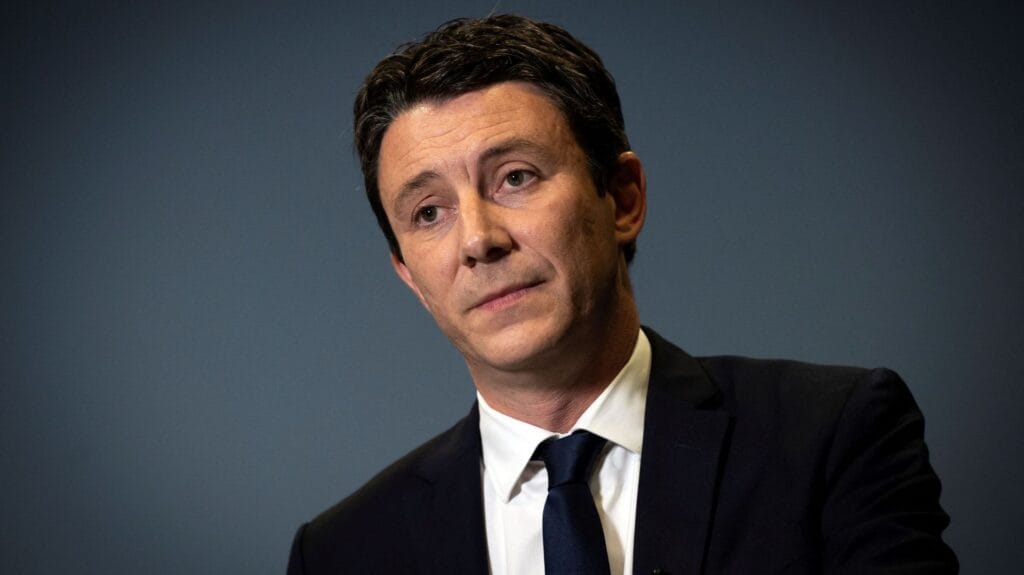
We can identify the following issues
1. A stink bomb strategy followed ‘by the book’ by those attacking Benjamin Griveaux.
The ease with which fixed media spaces can be created by slipping in elements of credulity provides the perfect platform for elements to be spread virally by relying on a few ‘launchers’ who are well-recovered by political opponents. These are the main ‘viral’ elements, but can we really blame them for using a campaign element that raises questions about Benjamin Griveaux's political positioning?
2. It is technically impossible for Twitter to deal with this type of case because of the way in which the criminal elements are changing.
Format changes, semantic variations and ethical issues mean that Twitter will never be able to meet the political challenges posed by this kind of phenomenon.
3. misdiagnosis on the part of the political and media class, which means that the real issues are not being addressed.
Prior to Benjamn Griveaux's resignation, the link was only shared 114 times on Twitter, and once on a Facebook page. Google searches didn't really start until 9am. In reality, the content was mainly known in the spheres of journalists (met beforehand) and politicians well before the general public spread at 5pm. This viralisation is just one of the threshold stages, but not the start of events.
4. A problematic Web memory
Insofar as digital traces remain accessible ad vitam eternam. On the contrary, the spread of this affair via tweets could not have been optimal insofar as tweets by Laurent Alexandre and Joachin Son-Forget have since been deleted.
Dans ces défis isolés autour du cas davantage explorés ci-dessous, nulle chimère médiatique présente, à savoir que :
- The question of anonymity never arises. Real people were the protagonists: in the production of the videos and images and in the propagation of the videos and images.
- An Americanisation of the media has never had any influence on the propagation context insofar as no media was a vector before Benjamin Griveaux's resignation. Not even a journalist.
The stink bomb strategy
The mechanism of stink bombs on digital networks is fairly stable compared to what we saw during the French presidential election, which is still :
- We isolate a weakness in a political opponent. This weakness is illustrated by a truth (our case here) or false elements on cloudy elements (As for the sources of financing of Emmanuel Macron which were exploited here and here )
- It's a static place, ideally with elements of credulity. During the presidential election, a fake Le Soir website site was used (same graphics, same architecture, same everything), as were Mediapart blogs. This was the case again here: the site was fed with other elements and even interviews, while the Mediapart blogs also relayed the information.
- Once the static elements are in place, it's time to go viral on social networks. This is done either by creating a dedicated Twitter account (which was the case here), by sending messages to journalists (which was also the case offline) and by using viral forums (4chan or jeuxvideo.com in our case).
- We let it brew while we wait for the first network bridges to share it. In our case, the sharing of Laurent Alexandre and Joachim Son-Forget was strategic.
- Political opponents are taking advantage of the ‘dish’ on offer. Apart from Joachim Son-Forget and Laurent Alexandre, we note that the vectors of the propagation are essentially militants opposed to the government majority.
The spread of the website alone was as follows:
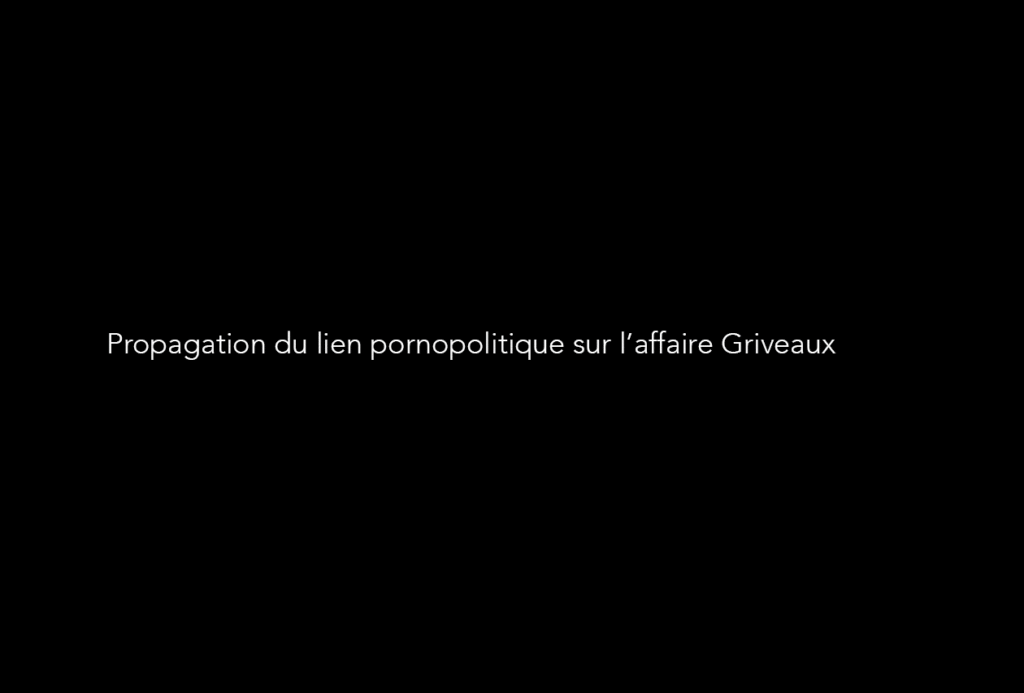
However, contrary to the infographic here, it seems that Joachim Son-Forget did share the link
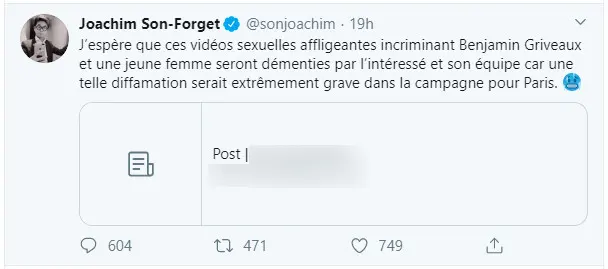
The website is powered by a dedicated PornoPolitique account.
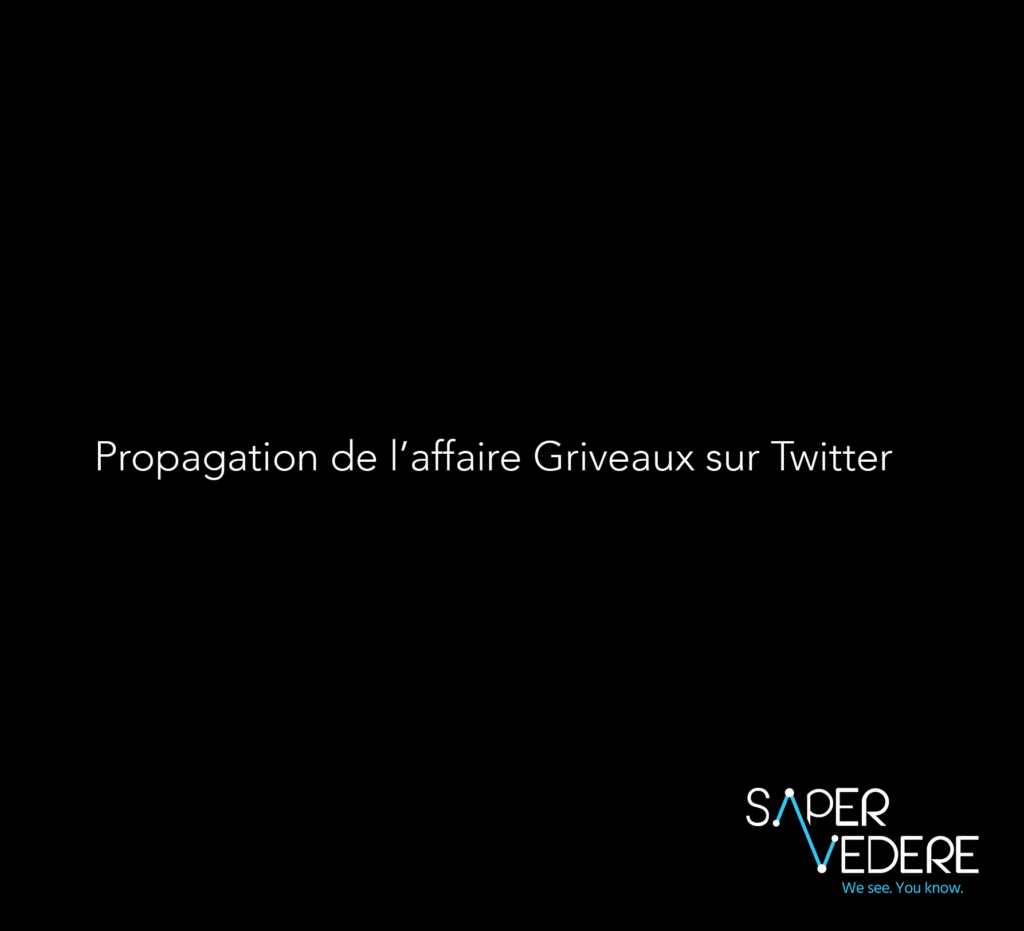
On Facebook, the public pages (we only have access to public data) that relayed the PornoPolitique link are groups close to the Yellow Vests.
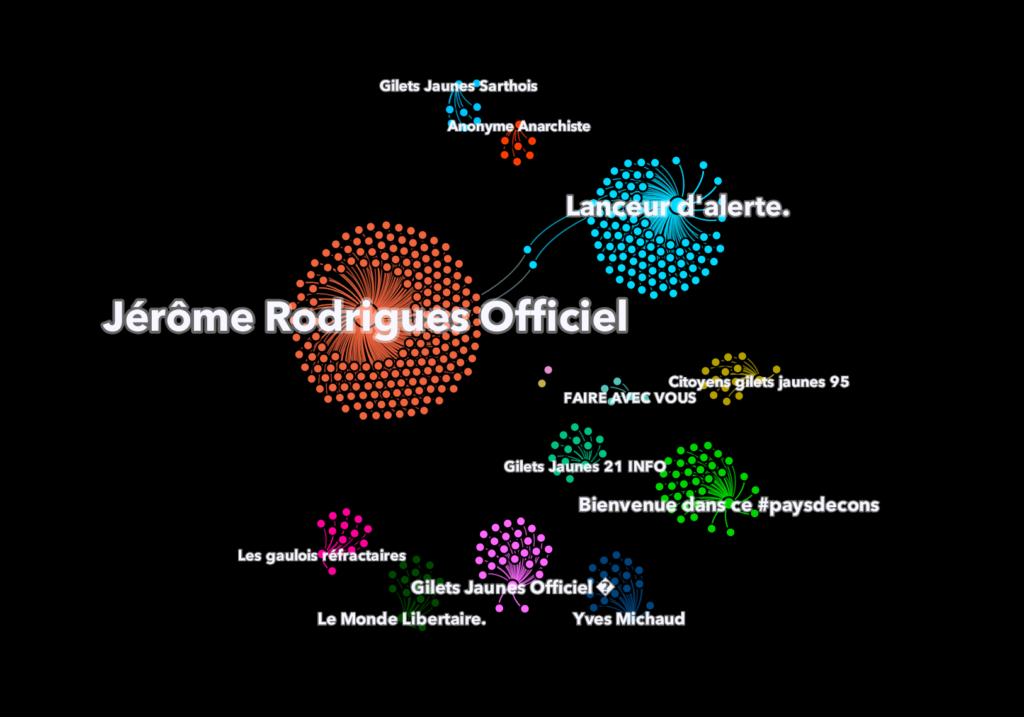
2. Poor propagation of the primary source
On Twitter, the primary source, the PornoPolitique website, was only tweeted 114 times before Benjamin Griveaux resigned and 577 times since the beginning.
On Facebook, excluding private groups and messages on public pages, the PornoPolitique site has only been shared once.
In reality, it's mainly because people will know about it from sources other than the website.
Internet users will migrate the formats that the grievances take. On the one hand, via blog articles like the one on Mediapart :
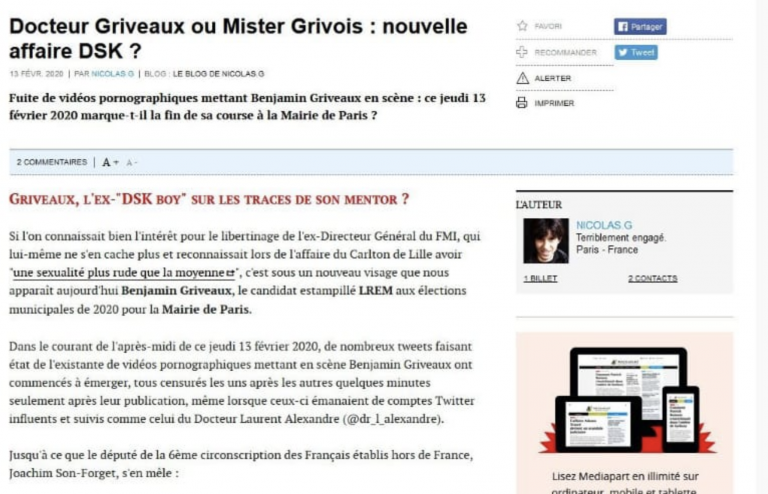
They will also edit the video, take screenshots or simply comment on it. The video will also be available on Pornhub and other hosting sites.
The entry points for content will also change once his resignation becomes official, as Google searches will begin at that point.
Already via PornoPolitique.com searches:

But also around the keywords :
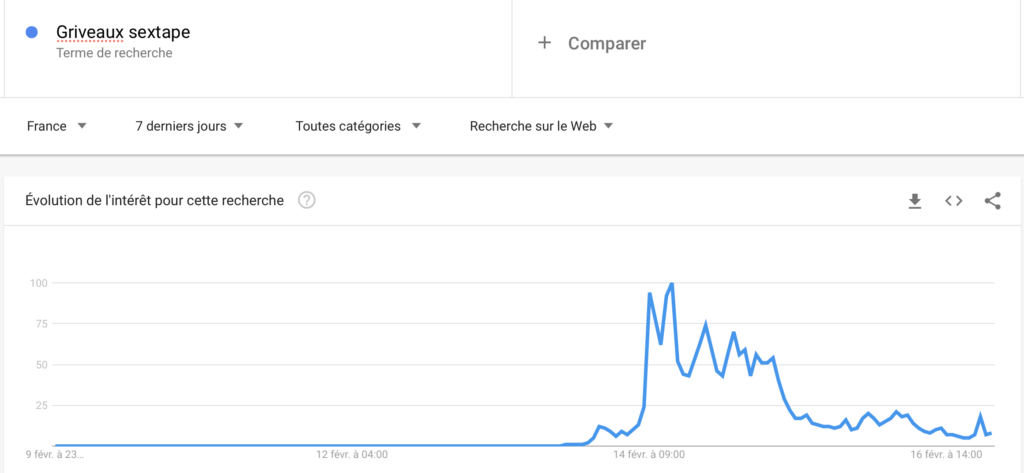
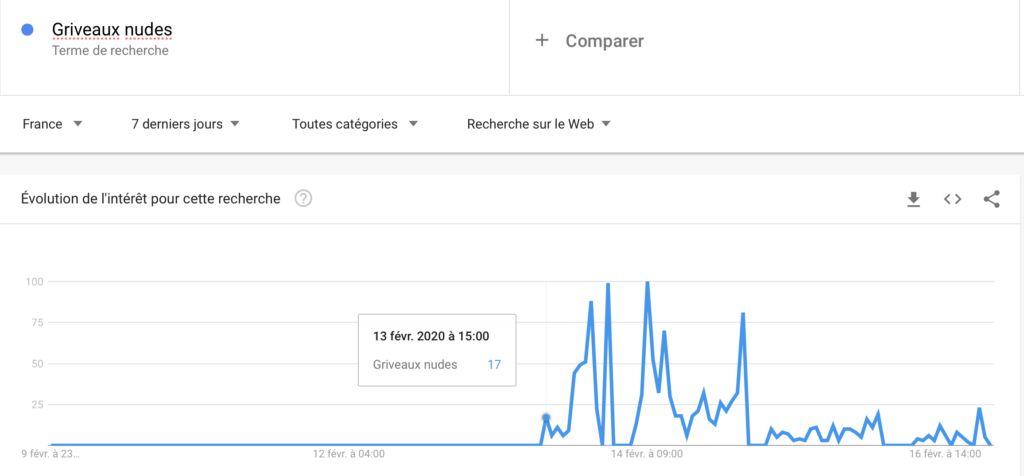
3. The difficulty for Twitter in combating this type of content
The various points of propagation mean that Twitter is technically unable to combat this type of propagation. It is impossible to point the finger at them for the following reasons:
- Propagation format: as we have seen, primary sources are carried by secondary sources. It is impossible to cut all the montages, all the related links, or to identify the sizes or weights of the formats. Even if Machine Learning and AI were 200 times more powerful than they are today.
- Trending topic : Les tendances émergentes permettent à pas mal de personnes de prendre connaissance d'éléments jusqu'à présent inconnu. Cela fait des tendances émergentes une aggravation des choses. Du fait des variations sémantiques (augmentation des mots-clés Griveaux, nudes, ou autres.) il est impossible de bloquer la visibilité de ces cas.
- Ethical considerations: and beyond all that, there are some essential ethical questions to be asked: isn't this the right to information? Is this not freedom of expression? These questions at least require some thought beforehand. This time for questioning will always ensure that viralisation goes faster than reaction.
Twitter is therefore unable to respond technically to this type of case, even though there is a real need for the platform with the blue bird to do so.
4. Memorising the Web
It is often said that the web has a memory. But above all, the foundations of the Internet as a decentralised structure ensuring the permanence of the network make it very difficult to claim a right to be forgotten.
So, even though the website has been taken offline, it is still available with the various caching systems:
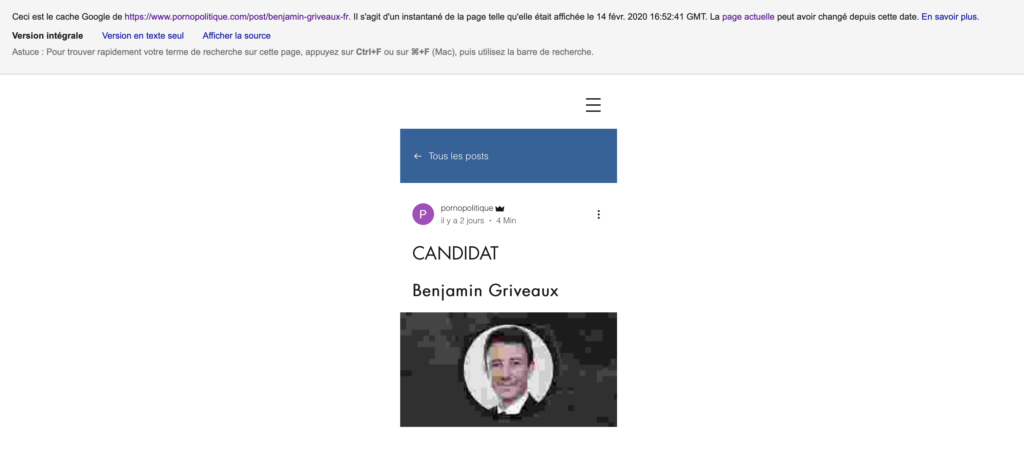
The transformation into a secondary source will also make it very difficult to delete everything, as the video is also updated in different places. What's more, even if the online digital copies were deleted, there would still be people who had kept physical copies of it that they could put online at any time.
Photo credit: GETTY



